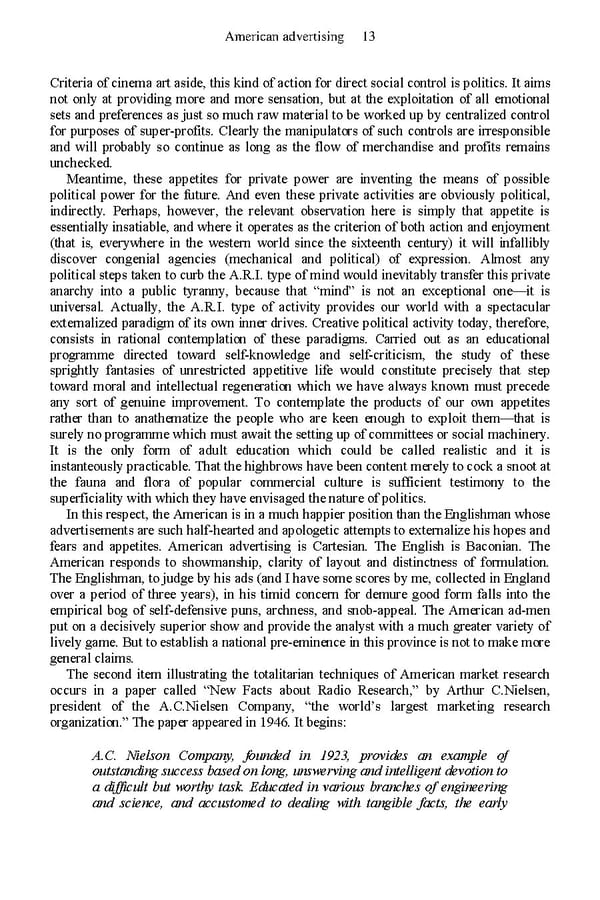American advertising 13 Criteria of cinema art aside, this kind of action for direct social control is politics. It aims not only at providing more and more sensation, but at the exploitation of all emotional sets and preferences as just so much raw material to be worked up by centralized control for purposes of super-profits. Clearly the manipulators of such controls are irresponsible and will probably so continue as long as the flow of merchandise and profits remains unchecked. Meantime, these appetites for private power are inventing the means of possible political power for the future. And even these private activities are obviously political, indirectly. Perhaps, however, the relevant observation here is simply that appetite is essentially insatiable, and where it operates as the criterion of both action and enjoyment (that is, everywhere in the western world since the sixteenth century) it will infallibly discover congenial agencies (mechanical and political) of expression. Almost any political steps taken to curb the A.R.I. type of mind would inevitably transfer this private anarchy into a public tyranny, because that “mind” is not an exceptional one—it is universal. Actually, the A.R.I. type of activity provides our world with a spectacular externalized paradigm of its own inner drives. Creative political activity today, therefore, consists in rational contemplation of these paradigms. Carried out as an educational programme directed toward self-knowledge and self-criticism, the study of these sprightly fantasies of unrestricted appetitive life would constitute precisely that step toward moral and intellectual regeneration which we have always known must precede any sort of genuine improvement. To contemplate the products of our own appetites rather than to anathematize the people who are keen enough to exploit them—that is surely no programme which must await the setting up of committees or social machinery. It is the only form of adult education which could be called realistic and it is instanteously practicable. That the highbrows have been content merely to cock a snoot at the fauna and flora of popular commercial culture is sufficient testimony to the superficiality with which they have envisaged the nature of politics. In this respect, the American is in a much happier position than the Englishman whose advertisements are such half-hearted and apologetic attempts to externalize his hopes and fears and appetites. American advertising is Cartesian. The English is Baconian. The American responds to showmanship, clarity of layout and distinctness of formulation. The Englishman, to judge by his ads (and I have some scores by me, collected in England over a period of three years), in his timid concern for demure good form falls into the empirical bog of self-defensive puns, archness, and snob-appeal. The American ad-men put on a decisively superior show and provide the analyst with a much greater variety of lively game. But to establish a national pre-eminence in this province is not to make more general claims. The second item illustrating the totalitarian techniques of American market research occurs in a paper called “New Facts about Radio Research,” by Arthur C.Nielsen, president of the A.C.Nielsen Company, “the world’s largest marketing research organization.” The paper appeared in 1946. It begins: A.C. Nielson Company, founded in 1923, provides an example of outstanding success based on long, unswerving and intelligent devotion to a difficult but worthy task. Educated in various branches of engineering and science, and accustomed to dealing with tangible facts, the early
 Essential McLuhan Page 19 Page 21
Essential McLuhan Page 19 Page 21